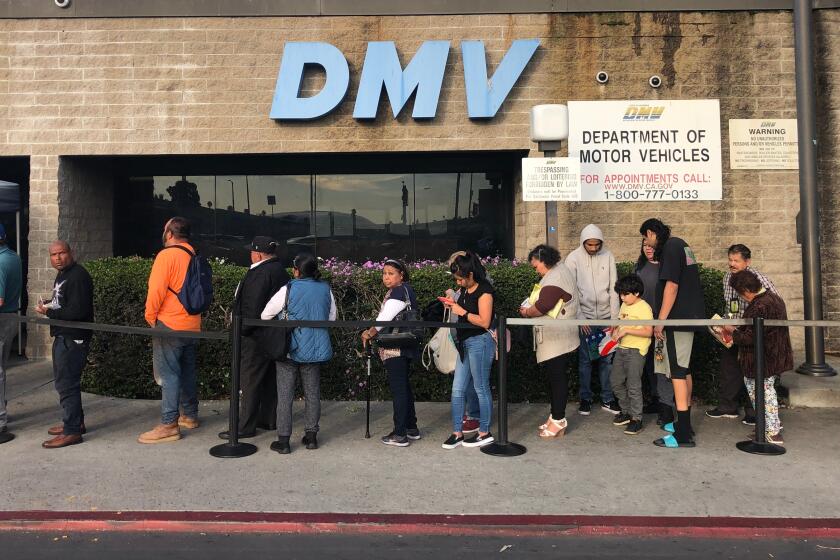Trump tariffs bring anxiety to Costco aisles: Cut back or stock up before prices soar?

- Share via
Sweeping tariffs have yet to hit the shelves of his local Costco, but Trinidad Estrada is bracing for the impact on his family finances.
The retired construction worker from Los Angeles said prices were already high, but the financial turmoil and fear of inflation fueled by President Trump’s on again-off again tariff proclamations have added pressure to economize.
He and his wife live on a fixed income, and the couple are shying away from beef, pork and chicken.
One bright spot, he said, was that the price of eggs had gone down.
“Look, all I’m buying is eggs,” he said as he loaded four cartons into his trunk. “Our check, not sure it can make it.”
In a Trump-friendly slice of California, concerns about higher prices and uncertainty about the economy were palpable as the White House announced tariff plans.
With stocks falling and economists predicting price hikes across a broad range of imported goods, there are plenty of anxious questions ricocheting in supermarket aisles these days.
Some are buying less and looking for ways to pinch pennies. Others are stocking up on some items in anticipation of price hikes.
Matters grew even more confusing Wednesday as Trump abruptly paused tariffs on most nations for 90 days, but announced a 125% duty on Chinese imports.
Economists warn that tariffs will hurt U.S. shoppers at grocery stores, department stores and car dealerships.
Consumers have not yet recovered since pandemic-era inflation peaked in mid-2022, and tariffs are unlikely to help, said Jerome H. Powell, Federal Reserve chair. In fact, they are likely to have the opposite effect.
Before this year, Maria Gonzalez and her family made small changes to adjust for the higher prices — buying fewer eggs, more chicken, less beef — but she has even less wiggle room these days. It’s frustrating.
“We try to buy just the necessary things, and just look around for deals,” Gonzalez said. “You really can’t do anything, can you?”
Why will tariffs affect your everyday purchases?
A majority of goods that Americans rely on are manufactured abroad.
At the moment it’s unclear how much prices will increase on everyday items such as food, clothing and pharmaceuticals — or big ticket items such as furniture, electronics, appliances, vehicles and car parts.
What is clear is that shoppers, along with importers and businesses, will foot the bill for the tariffs. That’s because the U.S. companies that import foreign goods pay the tariffs. Those funds go to the U.S. Treasury, and businesses typically pass the costs on to consumers through higher prices.
Costco shopper Steve Karman said he’s cutting back on “luxury” items, such as eggs.
When he spots a sale, he tries to stock up on the item when he can, but there are limits. He can fit only so many eggs in his refrigerator.
“It’s tough on the pocketbook, and I don’t see any relief coming,” he said as he unloaded a cart filled with groceries into his trunk outside Costco on Monday.
That increase could be a couple of percentage points for some products, but it isn’t the same across the board, said Christopher Thornberg, founding partner of Beacon Economics.
As the Trump administration and foreign governments haggle over exact tariff percentages, businesses in the U.S. are trying to prepare by negotiating deals with overseas suppliers, or looking for ingredients elsewhere so the price increase for shoppers won’t be too high, said Christopher Tang, senior associate dean of global initiatives at the UCLA Anderson School.
There’s still a lot of uncertainty when it comes to how tariffs will affect the economy because negotiations are still happening.
“Absent any resolutions of the differences, consumers may see the impacts in the next few weeks,” said James Mohs, associate professor at the University of New Haven.
And how long the effects of those tariffs will last is still unknown.
Though many experts say inflation effects will be short-lived, according to Mohs, Powell said last week that “it is also possible that the effects could be more persistent.”
According to analysts from Budget Lab at Yale, Trump’s tariffs announced the first week of April alone would cause an annual loss of $2,100 for the average household and $980 for low-income households.
Should you make a pre-tariff purchase?
It depends.
“Considering there are not anticipated supply line shortages, only anticipated price increases, bulk purchasing and stockpiling is not necessarily a good choice to mitigate future price increases,” Mohs said.
If shoppers return to pandemic-era stockpiling, then all of a sudden everyone is going to run to the store to grab the same thing, creating shortages.
“I hope that customers don’t go into panic mode because that hurts everybody,” Tang said.
It’s hard to predict what grocery item will be slapped with a tariff and for how much, because there are so many links in the supply chain.
For example, a chocolate bar that’s manufactured in the U.S., but whose cocoa beans are imported, could see a slight price increase. On the other hand, imported fruits such as avocados and strawberries aren’t subject to tariffs because they’re protected under the United States-Mexico-Canada Agreement, the Trump administration’s successor to NAFTA, but grapes are.
So soon, you might be seeing more grapes coming from Chile where the tariffs are lower and the price won’t be so high at the register.
With the uncertainty of the market and the possibility of a trade war looming, some people aren’t taking chances.
Justine, another shopper just outside the Los Feliz Costco who declined to give her last name, said she’s stocked up on coffee, vanilla and maple syrup. They’re not essential items, she pointed out, but they are things that have already gone up in price, and she’s concerned they may run low at some point.
“That may be harder to get later,” she said. “Everything is already super expensive.”
Experts warn that stockpiling may not help in the big picture, though.
Product shortages created by stockpiling and panic purchases often lead to price gouging, Thornberg said.
However, if you were already setting aside money to replace the HVAC system for your house or upgrade your dilapidated car, he suggests you make the purchase. Those items are going to “look a little more expensive after big tariffs get slapped on it,” he said.
Overall, the average customer “need[s] to be flexible, flexible in terms of the items you buy, the stores you buy from and be more vigilant about the price,” Tang said.
If you’re willing to shop around for better deals, Tang said, you’ll be able to find prices that fit your budget.
What should you know about the effect of past trade wars?
Tariffs have been a part of U.S. trade policy since the founding of the nation. But in periods when tariffs were high, they were consistent and targeted, said Robert Gulotty, associate professor in the department of political science for the University of Chicago.
“There is little historical precedent for this sort of rapid experimentation in tariff-setting, where tariffs are declared one day and dropped the next, or applied to all products from a country,” he said.
The difference this time is the tariffs are far-reaching and include all the countries we have large trade deficits with, Mohs said.
“The impact seems to be a combination of the 2008 financial meltdown combined with the dot-com bubble busting,” he said.
More to Read
Sign up for Essential California
The most important California stories and recommendations in your inbox every morning.
You may occasionally receive promotional content from the Los Angeles Times.













